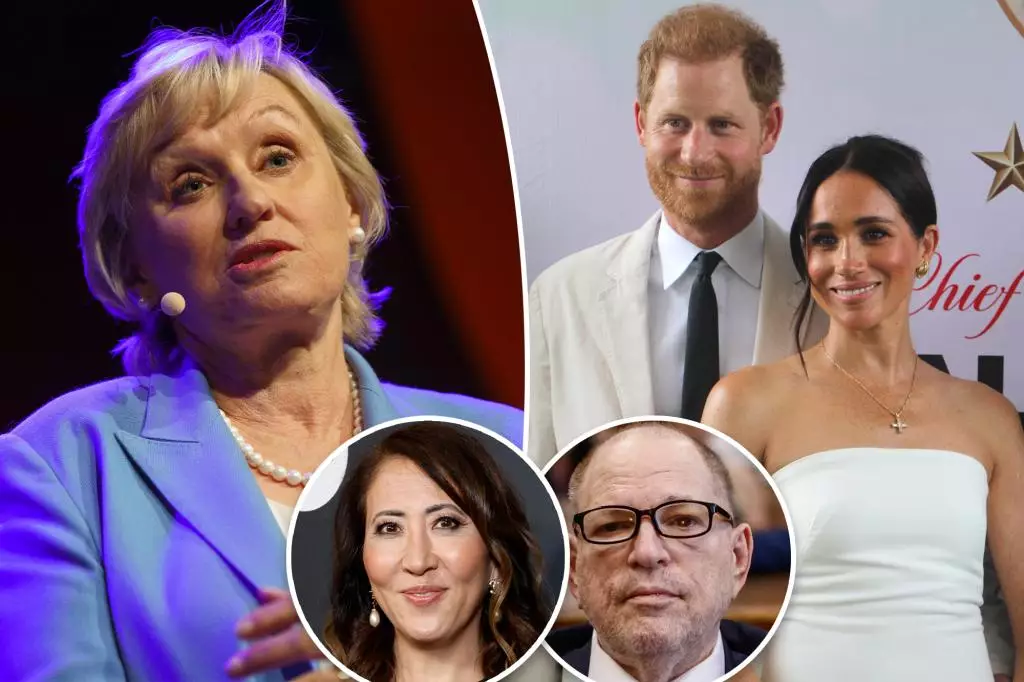In recent discussions about the Duke and Duchess of Sussex, Tina Brown, a renowned editor and author, has entered the fray with some stark criticisms. Her comments, shared during an episode of the Ankler podcast, suggest that she sees the couple’s public journey as fraught with misjudgments and miscalculations. Brown’s insights not only reflect her professional acumen but also offer a critical lens through which we can examine the often tumultuous relationship between the Sussexes and their public personas.
Central to Brown’s critique is her belief that Prince Harry possesses an innate talent for royal duties but is naïve in his relationship with Meghan Markle. Citing his natural abilities as a member of the royal family, she argues that his departure from royal duties has placed him in an unenviable position. Brown describes Harry as a “lamb to the slaughter,” implying that his decision to step away from tradition was ill-informed and shows a lack of worldly experience.
This perspective raises questions about the role of upbringing and institutional training in shaping an individual’s judgment and adaptability. Unlike his brother William, who remains firmly planted within royal protocols, Harry’s relocation to a celebrity-driven landscape poses unique risks. Brown’s commentary indicates that Harry may have misjudged his transition into private life, believing that his royal charisma would seamlessly translate into celebrity success.
Brown’s view of Meghan Markle is particularly harsh, depicting her as someone ill-equipped for the challenges she faced in her new role. By labeling her ideas as “total crap,” Brown suggests that Markle’s pursuits may lack substance and foresight. This bleak evaluation feeds into a broader narrative that questions Markle’s judgment and ability to navigate her newfound celebrity status.
An element of Brown’s critique that stands out is her assertion that Markle has a penchant for ignoring sound advice. This presents an interesting dichotomy: while Markle may enjoy public acclaim and attention, her professional choices face scrutiny as potentially misguided. The implication is that Markle’s journey, while ambitious, is perhaps overly ambitious without the requisite expertise.
Brown’s analysis extends beyond personal shortcomings; she raises concerns about the long-term consequences of the couple’s choices. Following their 2018 marriage and subsequent exit from royal duties in 2020, the Sussexes’ engagements have been met with mixed reactions. While some opportunities for branding and financial independence have emerged, there remains a persistent narrative of failure and public backlash.
Brown posits that Markle has reached a critical juncture in her career, having “run out of road.” This phrase underscores the precariousness of her situation; despite her high-profile marriage and subsequent celebrity status, her future ventures may now be tainted by a reputation for poor decision-making. This raises essential questions about how public figures can leverage their status without falling victim to public opinion.
Interestingly, Brown parallels her critique of the Sussexes with her own professional experience, particularly her ill-fated partnership with Harvey Weinstein in the late 1990s. By recounting her regret over collaborating with Weinstein, she highlights a universal truth: navigating the complex interplay of ambition and morality can lead to perilous missteps, even for seasoned professionals.
The mention of her experience with Weinstein provides a captivating contrast. While she disavows any personal misconduct, she acknowledges the difficult dynamics of the industry, painting a rather sobering picture of the entertainment world. This self-reflection positions Brown not just as a critic but as someone who has experienced the pitfalls of navigating a high-stakes professional environment.
As Brown reflects on the current state of the Sussexes, she leaves room for potential redemption, particularly for Harry. Unlike Markle, whose trajectory seems clouded by miscalculations, Harry still possesses the innate royal heritage that could allow him to reclaim his public image. While Brown’s criticisms may resonate with many, they also serve as a reminder of the challenges faced by public figures striving to forge new identities away from traditionally structured lives.
Tina Brown’s commentary encapsulates the complicated nature of celebrity life, particularly for former royals. Her critiques highlight the importance of judgment, adaptability, and the ramifications of public perception. As Harry and Meghan navigate this complex landscape, their choices will continue to be scrutinized, paving the way for a future that remains uncertain yet rife with potential.

Leave a Reply